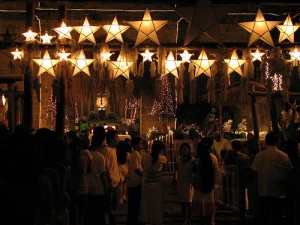Misa del Gallo in Spanish, Missa do Galo in Portuguese, Misa de Aguinaldo in Venezuela, and Simbang Gabi here in the Philippines. Whichever way we call it, this tradition will never banish every Christmastime.
Which one are you attending to? There are two schedules of Simbang Gabi which we know – one is during 4am and the other one is at night either 7pm or 8pm. The 4am mass carries a heavier sacrifice for the mass goers as it could be really hard for many to get up too early and stay away during the mass.
 Simbang Gabi would not be complete without the ‘wish’. For centuries now, it has been a belief by the faithfuls that if one would be able to complete the night mornings/nights, the wish they made would be granted.
Simbang Gabi would not be complete without the ‘wish’. For centuries now, it has been a belief by the faithfuls that if one would be able to complete the night mornings/nights, the wish they made would be granted.
Simbang Gabi is considered a novena, which is ‘novem’ in Latin, meaning nine. And someone who would like to ask for something to come his/her way is most likely to complete the nine consecutive days of prayer.
Of course, Simbang Gabi is made more interesting with the Pinoy Christmas delicacies parishioners look forward to after each mass. And yes, the dynamic duo of bibingka and puto bumbong.
Paired with a choice between tsokolate or salabat, bibingka and puto bumbong are two delightful treats to enjoy after Simbang Gabi.
Photo: therockstarbullcrap.tumblr.com
 WOWBatangas.com Your Source of Great News and Stories from the Province of Batangas, Philippines
WOWBatangas.com Your Source of Great News and Stories from the Province of Batangas, Philippines



